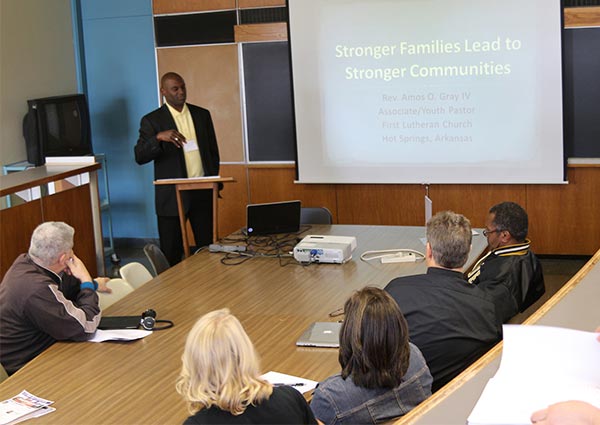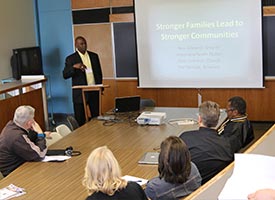
By Jeanine Tietz
FORT WAYNE, Ind. — “In the inner-city, poverty and crime and tension are all marks of these places, and when it’s that complex it can make the work there frustrating, and yes, it can be dangerous,” the Rev. Steven Schave, director of LCMS Urban & Inner-City Mission (UICM), said to those attending the “Stand Firm in the City” conference Oct. 12-14 at Concordia Theological Seminary, Fort Wayne (CTSFW), Ind.
“I truly believe that city mission is the mission field. … City mission really does need missionaries who are bold, who are brave, who will sacrifice, who will love,” Schave added.
As multiple speakers at the conference sponsored by the seminary and LCMS UICM noted though, becoming an urban or inner-city missionary can be as simple as moving your Christian family into an urban community and being involved neighbors who have connections to a local church.
The Rev. Larry Vogel, associate executive director for the LCMS Commission on Theology and Church Relations, said in his presentation, “Our confessed faith and our faithfulness to it require that we be sent into the city.”
Because of current demographic trends and because the members of the LCMS are 95 percent non-Hispanic white, Vogel stated that LCMS mission efforts must reprioritize “those least like us” by sending people into the city and also by identifying candidates from other cultures as potential church workers.
”For me, being a Millennial [and] a new church worker, [this conference] was very eye-opening,” commented Cristiana Ewert, a deaconess intern at Berea Lutheran Church, Milwaukee. “It moved me. It convinced me to let go of some assumptions I previously had.”
Although she was not raised in an urban area, Ewert said she is considering whether urban ministry is where God is leading her.
Urban ‘heroes’
“We have the joy to meet these challenges to reach the lost in … what I think is as fulfilling a mission as there is in the whole world,” Schave noted, referring to those in urban ministry as “heroes.”
But heroes are not made in easy circumstances.
Dr. Robert Lupton, author of the best-selling book Toxic Charity: How Churches and Charities Hurt Those They Help (And How to Reverse It), explained to conference attendees some of the challenges he experienced and the lessons he learned during 43 years of living and working in inner-city Atlanta.
“If you address a chronic need with a crisis intervention, people are harmed,” Lupton cautioned. Based on his experience, he added that food banks, free clothes closets and short-term service projects can actually create dependency in those they are trying to help.
Instead, Lupton said that urban communities truly benefit from long-term projects initiated and led by the members of the urban community. What is needed, he believes, is a change in the way urban dwellers are viewed — as a collection of resources, rather than a list of needs. He advocates listening to urban dwellers and making a long-term commitment to working with them, not just doing things for them, which generates potential for lasting change, for the better.
Unfortunately, many churches hesitate to make long-term commitments to urban and inner-city ministry, even though that is the only model that has proven to transform neighborhoods.
According to one church member in Lupton’s book Toxic Charity, churches continue to follow a model of short-term involvement “because it’s easier! … Churches want their members to feel good about serving the poor, but no one really wants to become involved in messy relationships.”
Relationships, opportunities
It’s exactly those relationships, though, that lead to opportunities to share the Gospel.
That is what Lewis A. King, a member of Holy Cross Lutheran Church, Fort Wayne, does in the barber shop he owns.
After living in an urban community for 20 years, King shares this advice: “We can’t hide in the churches. This has to go beyond a conference or a seminary. We need to go out into the community. We have to create relationships and let the Holy Spirit work.”
Redeemer Lutheran Church in Hyattsville, Md., is one congregation just outside our nation’s capital where these relationships flourish despite seven languages spoken among its members. They are bound together in the Divine Service every Sunday as a rare example of the heavenly tapestry of the body of Christ, according to the Rev. Eric Linthicum, the congregation’s pastor and a presenter at the conference.
“One reason why this works is because we involve people from all the cultural groups in our church in leadership positions,” Linthicum said. He added that this avoids an us-versus-them or landlord/tenant mentality, and allows his church to focus on outreach, including helping the homeless.
Mental illness often makes it difficult to form relationships with the homeless in urban and inner-city areas, though.
Conference speaker Bethany Yeiser is an author and motivational speaker with a passion to educate and inspire change in the way schizophrenia and homelessness are perceived and treated. She shared how her own struggle with schizophrenia caused her to be homeless for four years, often sleeping in the library of the university where she used to be an honors student.
‘Never give up’
“Never give up on a person who is mentally ill,” Yeiser urged. “They need an advocate and a support system even though they will try to push you away.”
One option presented at the conference for forming relationships in the community is Rebecca’s Garden of Hope, which provides a free template to start a tutoring and mentoring program.
An LCMS Recognized Service Organization, Rebecca’s Garden of Hope is “purposely focused on introducing Christ back into the lives of children and families” while addressing the “educational, physical, emotional, spiritual and social” needs of the children in the program, said Sanya Parson, its director and also a conference presenter.
Educational success
Educational success also is critical for community transformation, since studies show that low literacy rates are directly related to incarceration rates later in life.
Although some debate over whether emphasis should be on church planting or on community transformation occurred during the conference panel discussion, the evidence presented throughout the conference proved that it must be both.
This is “not social gospel,” assured the Rev. Dr. Carlos Hernandez, director of Church and Community Engagement for the LCMS, while citing Luther’s explanation to the fifth commandment.
The Rev. John Suguitan of Prince of Peace Lutheran Church, Cincinnati, added, “You have to work with other churches on civil issues, as long as it’s not Word and Sacrament ministry, because there just aren’t enough hands and feet.”
The Rev. Jeffrey Pulse, associate professor of Exegetical Theology at CTSFW, reminded conference-goers, “We act as if the people are the problem. The people are not the problem. The problem is sin.”
Encouraged by the stories of urban church workers, Schave issued this call to action at the end of the conference: “We truly need to be about going into the margins, … actually sending people into these really tough, marginal locations to reach out with the Gospel because that is what’s most needed for both rich and poor alike in our cities.”
Jeanine Tietz (mrstietz712@gmail.com) is a freelance writer and a member of St. Michael Lutheran Church in Fort Wayne, Ind.
Posted Oct. 22, 2015
